<<lien vers la version française / Link to the French version>>
The new Odesi search is officially live!
Odesi is now fully integrated with Borealis, moving away from the previous Nesstar repository, and is connected to the new Odesi search interface. We encourage everyone to use the new site, and all of its features, moving forward. An updated user guide for the new Odesi is now available.
Over the past year, the project team has worked hard to ensure that all the data and metadata have been migrated to the new repository in Borealis, the Canadian Dataverse Repository.
We thank everyone involved in the Odesi migration including the project team, the OCUL data community, and Compute Ontario for funding support.
Take a few moments to review the following FAQs that provide more detailed information about the changes and features of the new Odesi site. If you have any additional questions, comments, or concerns, send us an email at odesi@scholarsportal.info.
What is Odesi?
Odesi is a Canadian social science data repository and online data analysis tool. Odesi collections include over 5,700 datasets from government and public opinion polls, curated and described by staff at university libraries using the Data Documentation Initiative (DDI) metadata standard.
Odesi provides open and enhanced access to a variety of data collections such as Statistics Canada’s Data Liberation Initiative (DLI) public use microdata, historical datasets, and Canadian public opinion polls, including the Gallup Canada, IPSOS Canada, and the Canadian Opinion Research Archive (CORA).
The new Odesi is fully integrated with Borealis, the Canadian Dataverse Repository while retaining a unique search interface. Users can search across data collections, as well as filter, explore, tabulate, download, and subset datasets and variables of interest.
Going forward, much of the data in Odesi will be open and accessible to all researchers, aligning with the FAIR Principles (Findable, Accessible, Interoperable, and Reusable). This reflects OCUL and Odesi’s movement towards more open, inclusive, national data infrastructure, as well as an expanding service model that prioritizes sustainability and community collaboration.
Odesi is maintained by OCUL Scholars Portal the Odesi Markit! Program, a collective of individuals from OCUL libraries. The Markit! Program team — which includes hired students from OCUL institutions — is responsible for marking up and adding DDI metadata to Odesi datasets. Markit! is funded by OCUL, and the project helps to facilitate knowledge sharing, accessible data, DDI best practices, and collaborative data management practices.
How is the new site different and why were these changes made?
The new Odesi site is visually different with a refreshed user interface.
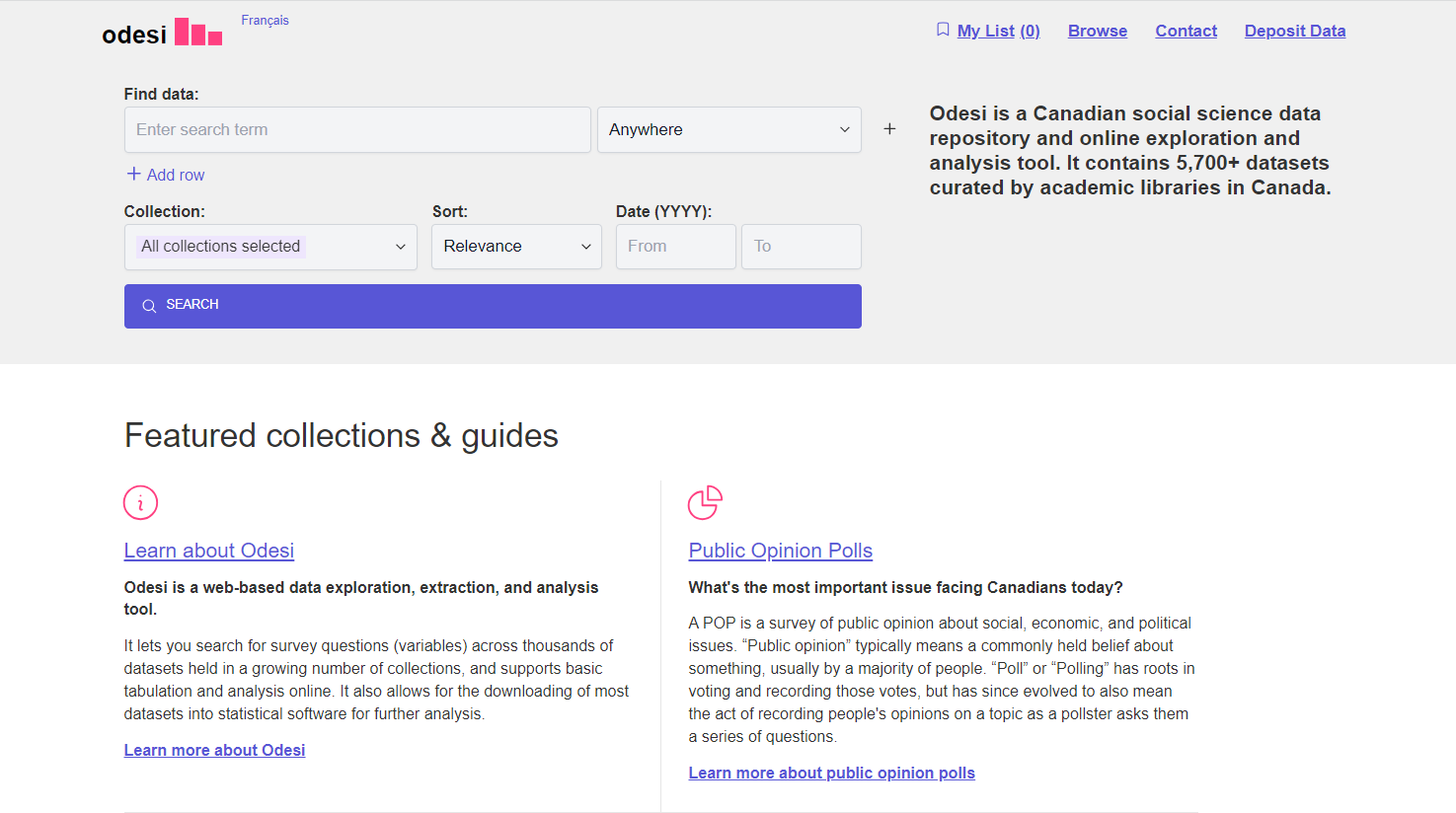
New Odesi search site.
Previously, Odesi was supported by a back-end repository platform called Nesstar, which has reached end-of-life status.
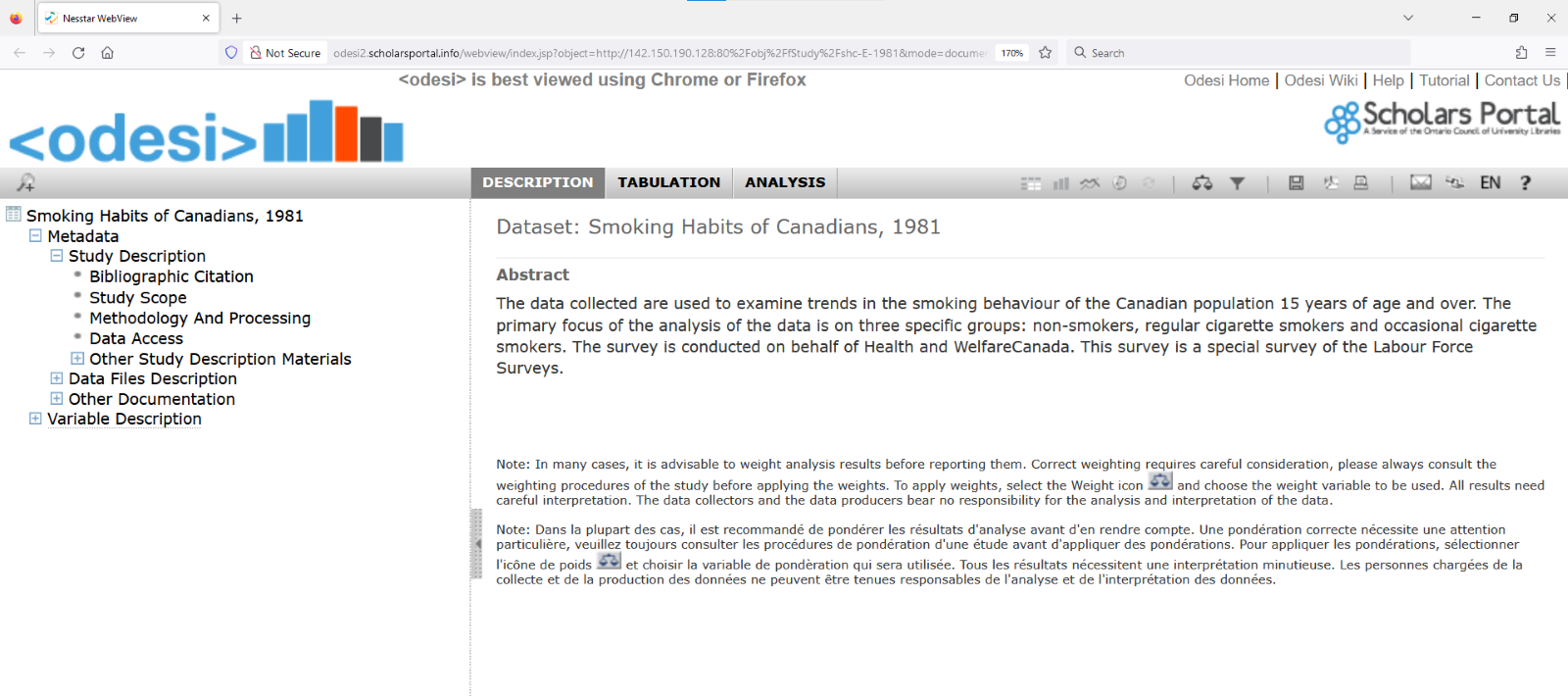
Odesi dataset in former Nesstar repository.
Moving forward, Odesi’s collections are supported by Borealis, the Canadian Dataverse Repository.
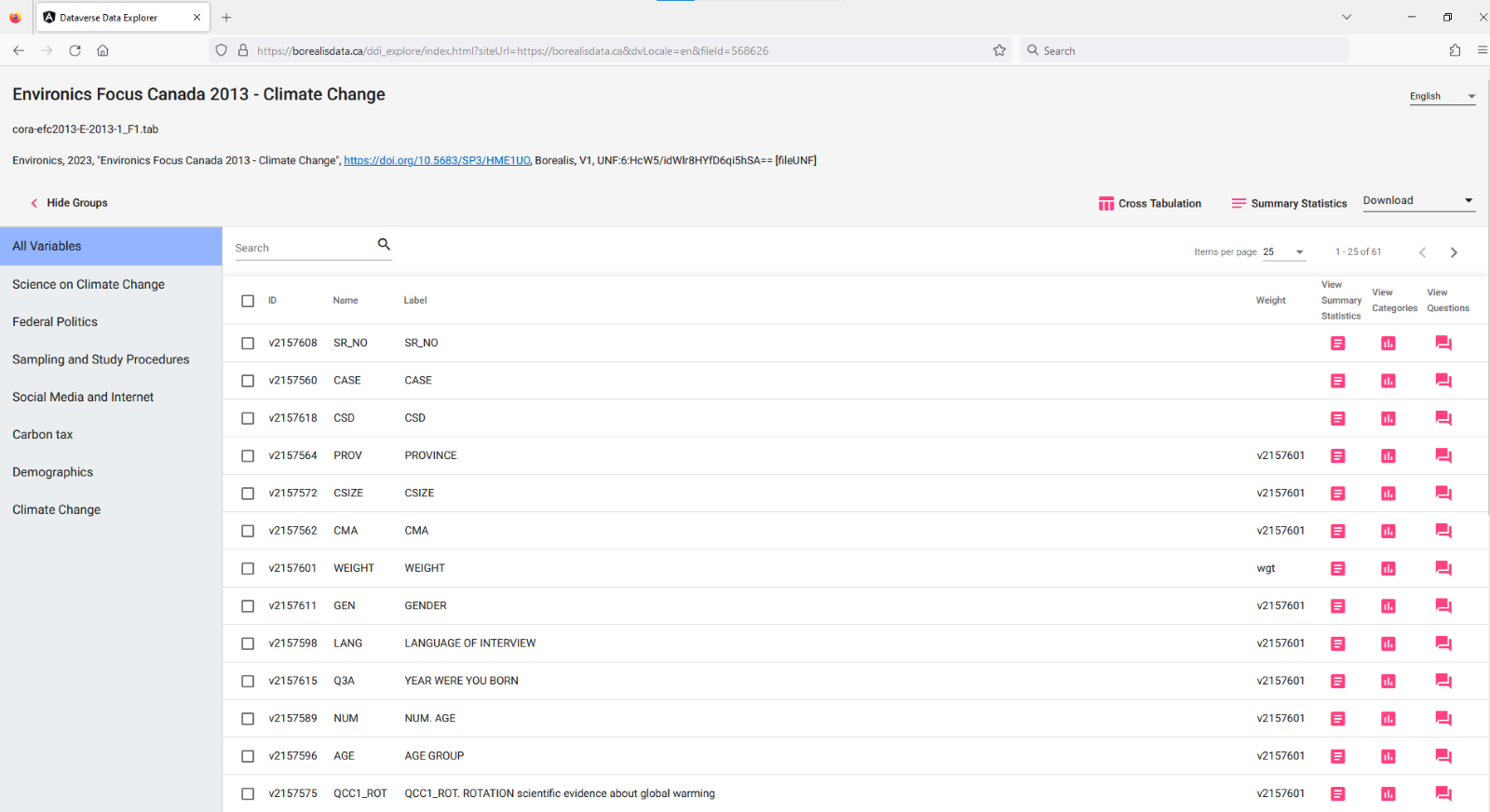
Odesi dataset in new, Dataverse Data Explorer tool.
Borealis was selected as Nesstar’s replacement due to its support for critical functions such as a bilingual interface, collaborative workflows for data deposit, the Data Documentation Initiative (DDI) standard metadata, DOIs for persistent data citation, and online data exploration and analysis.
The migration of Odesi data and metadata to Borealis allows Scholars Portal (Odesi’s service provider) to continue providing Odesi as a service, and to integrates new features which will support ongoing discovery, access, and preservation of data, contributing to Odesi’s overall sustainability moving forward.
The odesi.ca domain URL has not changed. While the new Odesi is integrated with Borealis, Odesi remains a unique service with its own search interface and distinct data collections. Odesi users and researchers working with social science data should still use odesi.ca for their research, rather than using the Borealis search interface.
More information about the history of the migration project is available on the OCUL website.
Can I still access the old Odesi search site?
No, the old search site is no longer available. The new User Guide is intended to help ease the transition from the old search engine to the new site.
What features does the new Odesi offer?
New features include:
- DataCite Digital Object Identifiers (DOIs) for Odesi datasets to improve discovery and standard citation.
- Enhanced searching and browsing features, including new search filters
- Options to explore survey questions and variables using Borealis Data Explorer and the Odesi search site.
- Options for data preview, subsetting, visualisation, and analysis using Borealis Data Explorer.
- Ability to download files directly from the Odesi search site dataset landing pages.
Citations
Dataset citations follow the Statistic Canada citation format and are available on dataset landing pages and in the “My List” tab for any saved datasets.
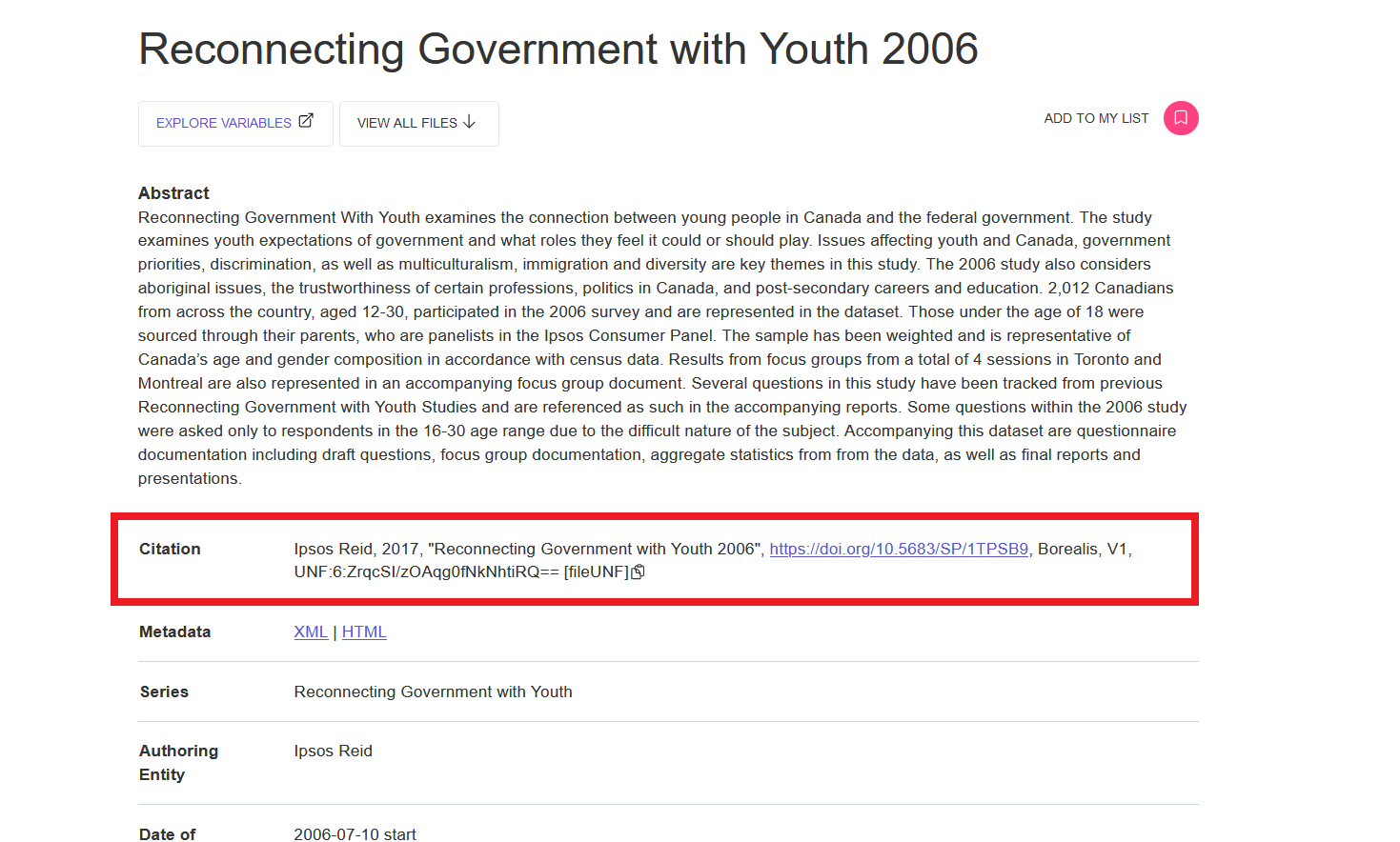
Dataset citation on Odesi search site, dataset landing page
From the “My List” page, users can export citations in TXT, HTML, or RIS format, or can choose to email themselves a list of saved citations.
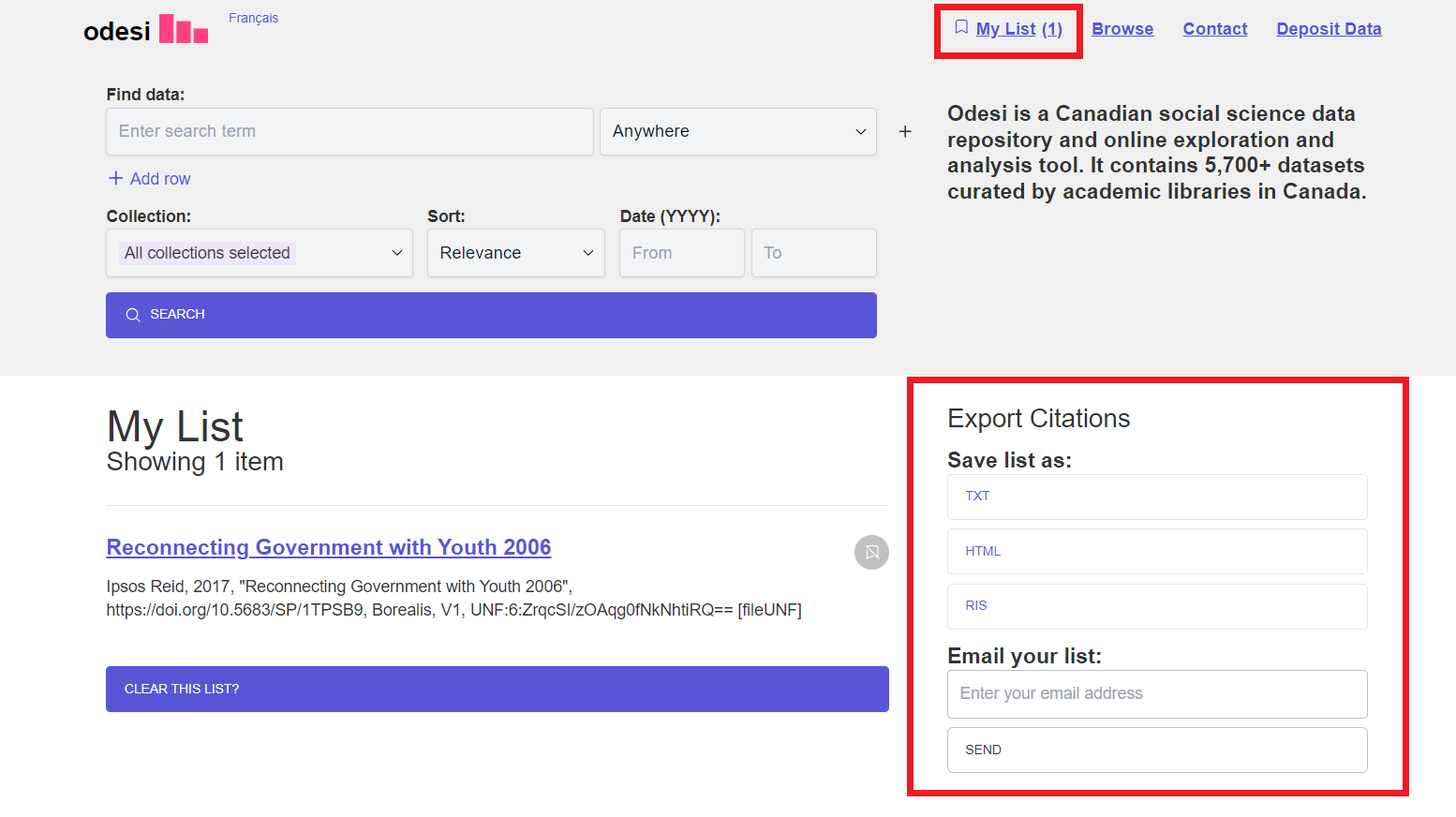
Dataset citation export options on Odesi search site, "My List” tab.
Weight Variable and Cross Tabulations
We have received some questions regarding weighting of cross tabulation results when using the Data Explorer tool. The weight variable needs to be declared in order to show the weighted values when conducting cross tabulations.
There are currently a number of datasets where the weight variable has not been declared. The MarkIt! group will be working to ensure that the weight variable is declared in these instances so that users would be able to turn on weight variables when using the cross tabulation feature. This work is underway, and we kindly ask for your patience throughout the process.
What documentation will be available to support learning and teaching in the transition to the new Odesi?
An updated Odesi User Guide is available in both English and French. The User Guide contains written guidance on navigating the new Odesi and its many functionalities, as well as screenshots from the new site for visual reference and reuse in institution-specific teaching materials.
Other materials include a new Odesi Best Practices Guide and a Data Deposit Guide, which will be available soon. A series of video tutorials are being prepared and will be posted to the Scholars Portal Youtube Channel and the web version of the new User Guide once completed. In the meantime, Scholars Portal hosted a webinar on September 21 featuring walkthroughs and visual demonstrations of the new Odesi site and features. from that presentation are available, as is a recording of the webinar through the Scholars Portal YouTube channel.
What will happen to the links that I have saved from the previous version of Odesi?
Scholars Portal will be setting up a website URL redirect process for links from the previous Odesi site to the new site. Old links with an embedded Odesi survey ID will be redirected to the new site’s dataset landing pages.

Previous Odesi Dataset URL Example
This redirect process will be active for a period of six months, beginning October 4, 2023. After six months, these automatic redirects will cease, and you will need to update links for the new Odesi site.
A static copy of Nesstar will remain available ‘as is’ for reference purposes until early 2024, but we do encourage everyone to use the new site for research, reference, and instruction from this point on.
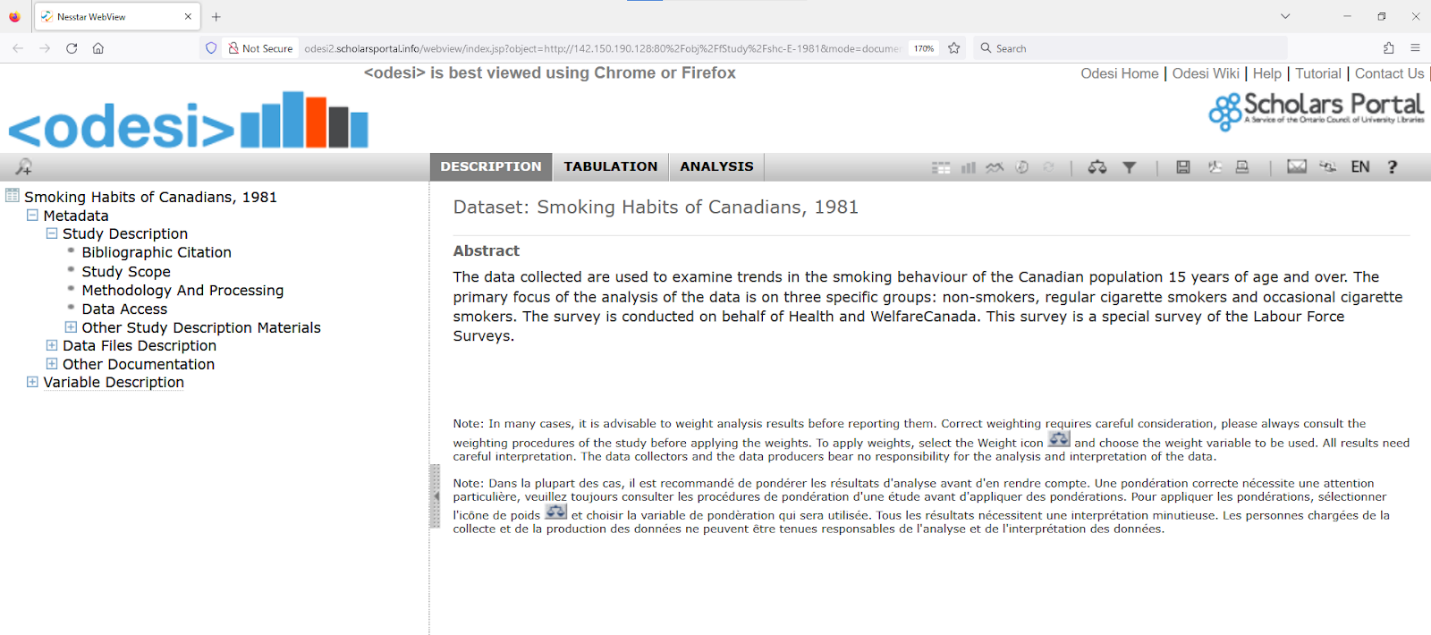
Odesi’s Nesstar Repository
How will Odesi institutional metrics be affected?
Previously, Odesi subscribers had access to metrics that were relevant to their own institutions. With the new Odesi – and with more open data collections in Odesi – metrics are no longer available by institution. New open metrics reports for Odesi’s collections will be available on Borealis.
Please contact us if you have any questions or concerns.
My institution would like to subscribe to Odesi. What is the subscription model for institutions outside of OCUL?
OCUL is committed to ongoing support for data curation in Odesi, and this includes review of service and subscription models. OCUL is currently working on a revised Odesi service model. More information will be available soon.
Who do I contact for help?
For general help with Odesi or for questions about the Odesi re-launch, training materials, and the new site please send us an email at odesi@scholarsportal.info.
For research support, please contact the data services representative at your local institution from the table below:
School | Contact |